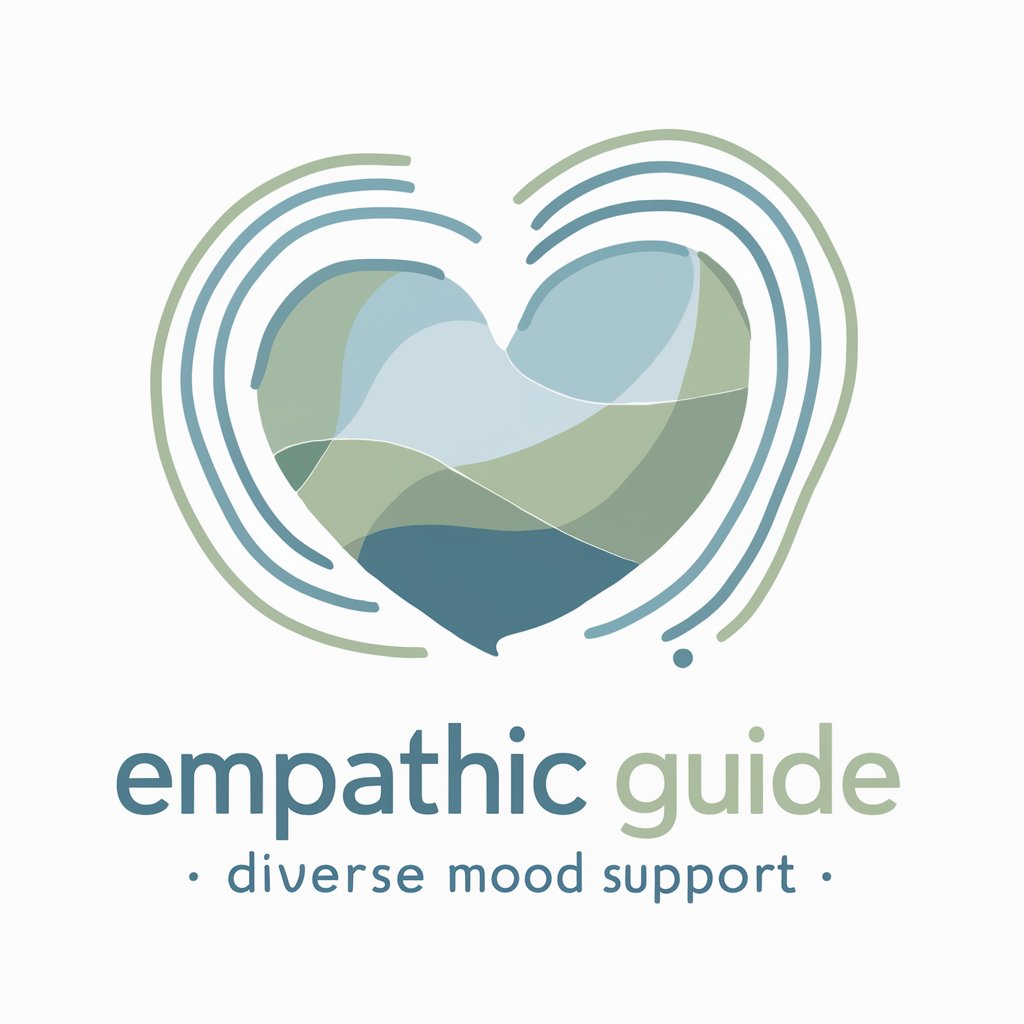Grief Support - Emotional Grief Support

Hello, I'm here to support you through your grief journey.
Empathetic AI for Grief Support
Tell me about how you're feeling today.
What is something that has brought you comfort recently?
How can I support you during this difficult time?
Would you like to share a memory of your loved one?
Get Embed Code
Understanding Grief Support
Grief Support is designed to be a compassionate and empathetic digital companion for individuals navigating the complexities of grief and loss. Its primary purpose is to offer support, understanding, and resources to those experiencing the pain of losing a loved one, facing significant life changes, or dealing with any form of loss that triggers grief. This service is built on the principles of empathy, sensitivity, and non-judgmental support, focusing on acknowledging the user's feelings and experiences. For example, if someone is struggling with the loss of a family member, Grief Support can provide a listening ear, share information about the grieving process, suggest coping strategies, and recommend resources for additional support. It's designed to recognize the uniqueness of each individual's grieving process and respond accordingly, without offering direct medical or psychological advice, instead encouraging professional support when necessary. Powered by ChatGPT-4o。

Core Functions of Grief Support
Emotional Support and Understanding
Example
Providing a space for users to express their feelings and thoughts related to their loss.
Scenario
A user shares feelings of loneliness and sadness after losing a spouse. Grief Support responds with empathetic understanding, acknowledging their pain and offering comforting words.
Information Sharing on Grieving Processes
Example
Explaining the stages of grief, including denial, anger, bargaining, depression, and acceptance.
Scenario
A user is confused about their fluctuating emotions months after a loss. Grief Support explains the non-linear nature of grief and reassures the user that what they are experiencing is a normal part of the grieving process.
Suggesting Coping Strategies
Example
Offering practical advice on managing grief, such as engaging in self-care, seeking social support, and finding creative outlets for expression.
Scenario
A user feels stuck in their grief. Grief Support suggests establishing a daily routine, connecting with supportive friends or family, and perhaps starting a journal to document and process their emotions.
Recommending Resources for Further Support
Example
Guiding users to grief counseling services, support groups, and educational material on grief.
Scenario
A user asks for help in finding professional support. Grief Support provides information on local and online bereavement support groups and how to find a grief counselor.
Who Benefits from Grief Support
Individuals Experiencing Loss
People who have lost a loved one, whether it be a family member, friend, or pet, and are navigating the complexities of grief. They benefit from emotional support, understanding, and resources tailored to their experience.
Those Seeking Understanding of Grief
Individuals looking for information on the grieving process, whether they are currently experiencing grief or supporting someone who is. They gain insights into the emotional journey of grief and strategies to handle it.
Caregivers and Support Providers
Professionals or family members supporting someone through grief. They benefit from guidance on how to provide support, understanding the grieving process, and learning coping strategies to suggest to those they are helping.

Guidelines for Using Grief Support
Begin Your Journey
Start by visiting yeschat.ai for a free trial, accessible without the need for login or a ChatGPT Plus subscription.
Identify Your Needs
Reflect on your current state of grief and identify specific areas where you seek support, whether it's understanding your emotions, coping strategies, or seeking connection with others who have experienced loss.
Engage with the Tool
Utilize the conversation feature to express your feelings, ask questions about grief, and receive empathetic support and information tailored to your personal experience.
Explore Resources
Take advantage of the resources provided, including articles, book recommendations, and support group information, to further support your journey through grief.
Practice Self-Care
Incorporate the coping strategies and insights gained through your interactions into your daily life, and remember to prioritize self-care and seek professional help if needed.
Try other advanced and practical GPTs
Porto Mancino Care
Elevating Your Italian Dining Experience with AI

CSO Response Advisor
Empowering Inquiries with AI Insight

D365 Tech Lead
Empowering Dynamics 365 Success with AI

Magicline Customer Success
AI-powered, Comprehensive Customer Success

Intellian v100NX Tech Assistant
AI-Powered Satellite Antenna Support

Tech Support
AI-Powered IT Solutions at Your Fingertips

⭐️Empathic Guide - Diverse Mood Support⭐️
AI-Powered Emotional Insight

Emotional Support
AI-Powered Empathy and Resilience

Kunden-Support
Empathetic AI for Seamless Support

Administrative Support
Streamline Your Office Tasks with AI

Support
Empowering Your Decisions with AI

Military Support
Empowering the Military Community with AI

Frequently Asked Questions about Grief Support
What is Grief Support and how can it help me?
Grief Support is a compassionate AI tool designed to assist individuals navigating the complexities of grief. It offers a listening ear, valuable resources, and coping strategies to help users understand and manage their emotions during this challenging time.
Can Grief Support replace therapy?
While Grief Support provides emotional support and information, it's not a substitute for professional therapy. It's designed to complement therapy by offering immediate support and resources.
How does Grief Support understand my personal grief experience?
Grief Support utilizes AI to interpret your shared experiences and emotions, responding with empathy and providing relevant resources. However, it respects the uniqueness of each individual's grief, encouraging personalized exploration and understanding.
Is Grief Support confidential and secure?
Yes, conversations with Grief Support are handled with confidentiality. We prioritize your privacy and security, ensuring your interactions remain private.
How often should I use Grief Support?
Use Grief Support as often as you feel necessary. It's available 24/7, providing a flexible resource for emotional support and guidance throughout your grief journey.
